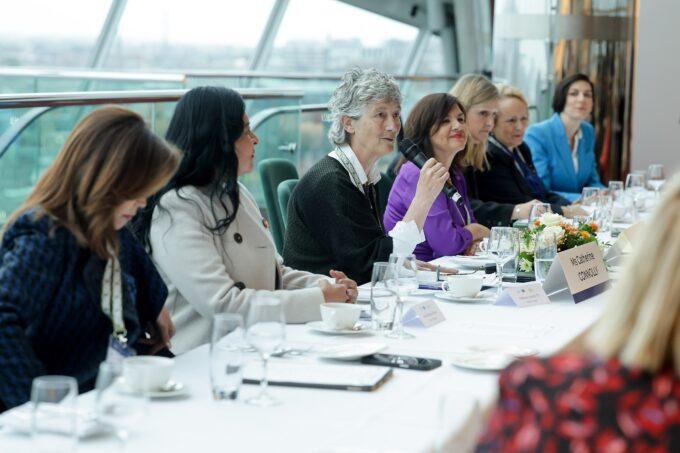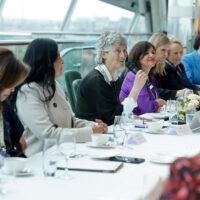


































































Photograph Source: Houses of the Oireachtas – CC BY 2.0
Ireland just made history by electing Catherine Connolly as its next president in a milestone victory that attracted international attention. Historian Van Gosse referred to her as “someone we can be proud of, unlike the Plastic Paddys who parade their ‘Irishness’ in this [US] country.” Activist and author Medea Benjamin commented, “Ireland just reminded the world what moral leadership looks like, electing a president who speaks for justice, stands with Palestine, rejects NATO’s militarism and wants to preserve Ireland’s neutrality.” At the same time Connolly crucially “still supports Ukraine and condemns Russian aggression, [and] one can legitimately recognize both,” indicated international relations scholar Stephen Zunes.
Connolly is a socialist politician known for her advocacy of peace, equality, and social justice. She held over 900,000 first-preference votes. Her election marks Ireland’s tradition of progressive leadership as this all brings up new questions about the nation’s future in Europe and around the world.
To understand Connolly’s win, I spoke with scholar and political scientist Yvonne Galligan — a leading academic concerning Irish politics and gender studies and lead editor of States of Democracy: Gender and Politics in the European Union (Routledge, 2015). In this conversation, exclusive for CounterPunch, Galligan talks about Connolly’s surge within Ireland’s social transformation since the 1990s, considers how her presidency might influence debates on neutrality and Europe, and speaks on the state of justice-centered movements/coalitions that challenge the current political orthodoxies.
Daniel Falcone: First, what does Catherine Connolly’s victory show Ireland and the world about the current mood of the Irish electorate?
Yvonne Galligan: That’s a very interesting question. Since Connolly received over 900,000 first-preference votes, about two-thirds of the total votes cast, it was clear that the electorate strongly endorsed the platform she stood on — one of peace, justice, [and] equality. She clearly articulated those principles. The Irish people responded to them.
It’s important to note that in a presidential election, party loyalty is not as strong as a general election — voters feel freer to make independent choices. Many supported Connolly because her platform represented a distinction from government policy at this time. Both factors reflect the electorate’s current mood and a desire for integrity, fairness, and politics based on social values. She was also seen as an anti-establishment candidate and since the electorate is currently disillusioned with the centre-right government, it is not seen as delivering on its promises of housing and cost of living.
Daniel Falcone: How does Connolly’s victory fit into Ireland’s political and social changes dating back to the 1990s?
Yvonne Galligan: Connolly’s politics are very much the politics of the past 25 years or so (and rather than of the 1980s). Her election, following 14 years of Michael D. Higgins, a president with similar progressive values shows that the Irish electorate still has an appetite for socially progressive politics. While that vision continues to resonate, however, new and divisive “wedge issues” are emerging that could shape Ireland’s future. Immigration is one, the question of Ireland’s neutrality is another. As president, Connolly will need to navigate these carefully, since they have the potential to polarize public opinion in years ahead.
Daniel Falcone: Could you talk about the ways Connolly might influence Ireland’s international role, especially around neutrality, Europe, or social justice, considering her victory?
Yvonne Galligan: Of those issues, social justice is probably the most compatible with both the electorate’s views and Connolly’s own conviction. She’ll likely be a strong advocate for social justice at home and abroad, which fits comfortably within the moral and symbolic powers of the presidency. The president doesn’t have formal political authority but does have influence, the [soft] power to represent national values and shape public discourse. Supporting social justice, therefore, will come naturally to her.
On neutrality and Europe, things are more complex. Connolly can take the temperature of public opinion on these matters and reflect it in her public statements. At times this could challenge the government, which seeks greater flexibility around Ireland’s neutral stance in recent years. During her campaign, Connolly was critical of the militarization of Europe and of using arms production to support European economies — she even singled out Germany in that regard. These are complex debates, but as president she will have an important role in giving voice to Irish public sentiment.
Daniel Falcone: To what extent would you say Connolly’s victory is a story of credibility and perseverance (versus the status quo of Irish politics)?
Yvonne Galligan: Her political story spans over 25 years. She was first elected to Galway City Council in 1999 and became a member of parliament for Galway West in 2016. Her positions haven’t always aligned with the mainstream. Even within the Labour Party, from which she parted ways in 2006. She wanted to run alongside Michael D. Higginsbut wasn’t selected.
Running as an independent in Ireland is never easy. Candidates go up against party loyalty, but Connolly persisted. Connolly had unsuccessful runs in 2007 and 2011, but she was elected in 2016 and earned respect across the political spectrum. Her election as Deputy Speaker of the Dáil in 2020 confirmed the esteem in which she was held. Connolly is regularly regarded as principled and capable. So yes, Connolly’s story is one of perseverance as she faced the political establishment. She managed to be an “outsider on the inside,” working independently yet earning respect within the system and that’s no small feat.
Daniel Falcone: That makes me think of New York City right now, which elected a democratic socialist, Zohran Mamdani. He’s galvanized support through human/economic rights advocacy, social movements, resistance, and identity. It feels like there’s a similar energy with Connolly—that in the age of autocracy, her victory represents a kind of symbolic soft power. As you said, it’s about “outsiders on the inside” serving in public life. Do you think this reflects a larger global response and a backlash against Trumpism and Euroscepticism?
Yvonne Galligan: I do. Connolly’s victory is very much part of that pushback. Not necessarily against authoritarianism in Ireland, since we don’t have that, but against a deeply entrenched political status quo. It’s interesting to compare their campaigns. Connolly’s was distinctly grassroots. She held many smaller events across the country, and her supporters were quite active at the community level of analysis. Her campaign had a media presence, and it was fundamentally a people-powered movement much like Mamdani’s. Both focused on issues of social justice and human rights, and both criticized those in power for failing to address the everyday concerns of citizens. Connolly’s victory mirrors a trend and an appetite for politics that is participatory. People are tired of the hierarchy.
Daniel Falcone: Could you talk about Connolly’s role as an activist. She’s an outspoken voice for the Palestinian cause. How do Mideast issues relate to the politics of Ireland?
Yvonne Galligan: She has been very forthright for many years in support of Palestinian right to sovereignty. She has also spoken out about the war in Syria and the genocide in Gaza. In holding these views, she is reflecting the views of most Irish people, and indeed the position of the current government. Ireland has its own experience of sectarianism and struggles for equality and human rights in Northern Ireland.
The Good Friday Agreement which eventually brought the violence to an end is the cornerstone of peace on this island. Violence in the Middle East, be it Gaza, Syria, and elsewhere, evokes the trauma of 30 years of violence in Northern Ireland. It generates a substantial commitment to building peaceful societies where difference is respected, not weaponized. Still today, communities and politicians in Ireland work on resolving the legacy of the past conflict in order to build a peaceful, positive future for generations today and to come. This is a perspective that Ireland brings to the world stage, and one that Catherine Connolly can fully, and authentically, represent.
Daniel Falcone: Can you talk about how the grassroots dynamics and behind-the-scenes coalitional work allowed the Connolly election to become possible?
Yvonne Galligan: Connolly had a number of advantages going into and during the election campaign. One was that she was the first to formally declare her candidacy, backed by the Social Democrats, People Before Profit, and some non-aligned politicians. This gave her a clear run in the media of over a month before another candidate declared Heather Humphreys of Fine Gael. The second advantage was her endorsement by a united block of left-wing parties. The Labour Party and later the Green Party endorsed her candidacy. In the background, negotiations were underway with Sinn Fein. Connolly’s visit to Belfast in late August during which she promised to uphold a united Ireland gave Sinn Fein the reassurance needed to secure that party’s support. Before the nominations closed, Connolly had the backing of the full range of left parties, which put significant campaigning resources at her disposal.
Connolly did not only rely on this political backing coalition. Her third advantage was that she formed other coalitionstoo – with trade unions, disability activist groups, students and civil society campaigners for rights and social justice. Young people were very much attracted to her and provided much of the social media savvy that was a hallmark of her campaign. She attracted a large army of volunteer support and deployed their enthusiasm and skills to canvass, post and donate to the campaign. Connolly created a wide-reaching coalition that reached well into the grassroots communities and tapped the energy of an electorate looking to admonish the government for their lack of delivery on issues – issues such as housing, the cost of living, and public services.
The post How Catherine Connolly Can Redefine Irish Politics: an Interview With Yvonne Galligan appeared first on CounterPunch.org.
This post was originally published on CounterPunch.org.